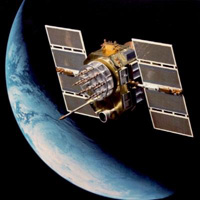Putin: Russia's global satellitle system to beat USA's GPS
Vladimir Putin hopes that Russia's global positioning satellite system GLONASS will work better than its American match GPS. The President of Russia thinks that GLONASS will sustain the competition if it performs perfectly. “To make the consumers choose GLONASS the system should work without failures, better than GPS”.

This matter was discussed at the recent meeting of the President with the members of the government. At this meeting the President himself said that Russian global positioning system is “cheaper and better in quality”. The unsaid logo “price and quality ratio” is typical for many Russian military and dual purpose products. “ Most sophisticated does not mean the best ”. At the same time in the sphere of global positioning systems Russia has serious reasons to claim technical supremacy. First of all the being deployed GLONASS is noticeably more accurate than its American match, at least as of today. Secondly GLONASS satellites use different frequencies, which makes it jamming three times more difficult than GPS, working on one frequency. For military users it has principle importance .
The weak point of the Russian project is the civil use of the system. Designed and deployed as far back as in the Soviet Union GLONASS has been cut off from the operation and use during the economic turmoil of 90s. Now the state is hurrying to restore the system using new generation satellites. Originally it was planned to restore GLONASS by 2010. in 2005 President Putin publicly demanded speeding up the terms of commissioning. According to the latest plans, which are about to come true, in the end of 2007 GLONASS will cover Russia completely (beginning of commercial use) and in 2009 it will be 100% global.
First Vice Prime Minister Sergei Ivanov personally tackles the project. Earlier he declared that by the end of this March the program of using GLONASS would be developed not only for the needs of the state, but also for the rank and file consumers. Because of this in the end of the past year Russian military institutions withdrew the restrictions on accuracy for the civil users of maps. Preparing for the full-fledged global positioning system Russia is actively developing the civil usage of the equipment in transport (even by administrative methods), agriculture, cars, individual kits etc. According to the special program of the Ministry of Industry the budget of GLONASS will be 321.8 million rubles in 2007 and 341.5 million rubles in 2008. Omsk based NPO PM Reshetneva is the head organization of the space based segment of GLONASS.
Russia's GLONASS is the second global positioning system in the world. The interest to these systems raised after NATO’s campaign against Yugoslavia. The European allies of the US found out that without informational support from the American GPS independent warfare is practically impossible. Having experienced total dependence on the American system the Europeans decided to set up own match, Galileo.
There were attempts to work together with the Russian specialists, but they failed. Today Galileo is experiencing serious technical difficulties and most likely it will be set up much later than GLONASS. China announced its plans for a Chinese global positioning system, but this one is still more uncertain. Today practically no other nation is capable of setting up a global positioning system independently. At the same time the importance of such systems for military use is growing. De facto the use of high precision arms, guided missiles etc is impossible without using global positioning for aiming. In the foreseeable future the system will be brought down to the level of individual soldiers. Most of the Russian exported military hardware has the equipment capable of using GPS and GLONASS.
Yuri Seleznyov
Pravda.ru
Subscribe to Pravda.Ru Telegram channel, Facebook, RSS!





